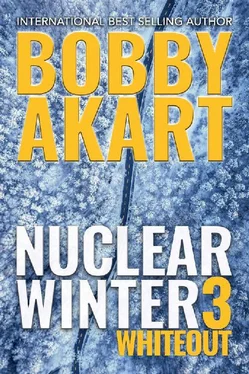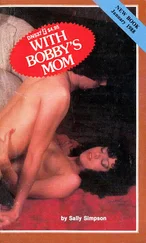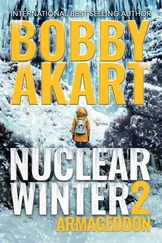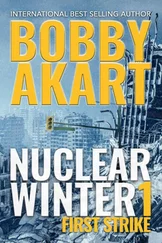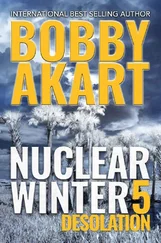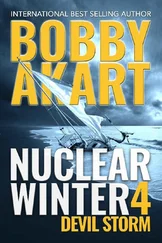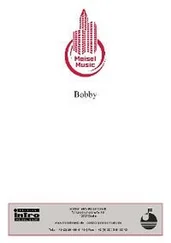The truck slowly rumbled across a bridge high above the Henry River. Two more armed guards were positioned on the other side behind concrete barriers. They never blinked as their eyes scanned the cargo truck and its passengers. They held their weapons at low ready, just in case.
Peter craned his neck to study the compound from the south side of the river as they continued up a hill. Eventually, the former movie set turned haven, for some, disappeared from sight. He got settled in with the others as the monotonous drone of the diesel engines began to put nearly everyone to sleep.
Their trip took them through the heart of the Old South. Towns like Gaffney, Saluda, and Barnwell in South Carolina were encountered without incident. Once in Georgia, they drove through Statesboro toward Jesup.
They’d been on the road for nearly eight hours, and the passengers were getting antsy. Mr. Uber had only afforded them one pit stop, as he called it, to stretch their legs and relieve their bladders in a looted Huddle House. He and his son swapped driving duties, during which time a passenger overheard them say they planned on stopping near Jesup, Georgia, to refuel and sleep.
During the ride, Peter struck up conversations with every one of his fellow passengers. Some were more open than others about their destination and the price they’d paid for inclusion on the trip. Most had traded guns or silver coins. The elderly couple had given up their wedding bands. One family had turned over the keys to their vacation home outside Asheville, North Carolina.
The two people he was most concerned about were a mother in her late thirties and her daughter, who appeared to be college age. They were closed off about where they were headed and why. Plus, they shut Peter down when he asked what they’d had to barter to get a ride on the truck. The daughter closed her eyes and hung her head low. Her mother shed a tear and looked away as she wiped her face with her sweater sleeve.
Peter had heard rumors of women being forced to trade sex for food, gasoline, and, apparently, a lift to Florida. It angered him that the two men sitting in the heated cab, laughing and swapping a bottle of whiskey, had enticed these two women with a ride by demanding them to humiliate themselves that way.
At one point toward the end of the ride, murderous thoughts crept into his head. He replayed the events in the CVS pharmacy that night. Was that murder or self-defense? Or was his shooting of the four men in rapid succession a preemptive first strike? A kill-or-be-killed scenario that required him to murder others to protect himself.
Then he took his analysis further. Did he have the right to take the lives of Mr. Uber and his ingrate son because they’d asked for, and received, sexual favors in exchange for an uncomfortable seat on this truck? Had America descended into a level of lawlessness where killing could be justified on moral grounds?
Peter grappled with these issues for miles, and as a result, the time flew by as Greyhound slowed the cargo truck at the entrance of the aptly named Motel Jesup. The twenty-two bungalow-style units were arranged in an L-shaped structure connected by covered walkways. The affordable accommodations were the epitome of the quintessential, roadside motor court of days gone by. Before the nation’s interstate system provided travelers the opportunity to zip from one point to another at seventy-plus miles an hour, state and federal highways had connected small towns together. Within each small town, there were motor courts.
Many had been built in the late forties as soldiers returned from war and families reconnected by taking long driving trips. The freestanding buildings were quaint and modestly furnished in order to keep the nightly room rate low. Most had a bed and foldout sofa.
The Motel Jesup had plenty of vacancies that night. As in, all of the rooms were empty. Looters had broken into them to take the bedding. They’d stolen the remaining complimentary bottled water and Lance crackers. The toilet paper and towels had been removed, as were the trial-size toiletries. All that remained were the mattresses and perhaps a few pillows.
The cargo truck rumbled to a stop, and Mr. Uber stumbled out of the cab. He reeked of liquor as he waddled to the back gate.
“All right, people, this is where we’ll hole up for the night.” His words came out slowly and slurred.
His son, Greyhound, was less inebriated and began to order everyone out of the truck. “You heard him. Let’s go! It’ll be dark soon. And cold, too.”
Peter had been the last to be loaded into the cargo compartment, so he was the first to be removed. He tossed his duffel bags out first and began to climb out of the back when Greyhound interfered.
“Hey, let me give you a hand.”
Instead of helping Peter, he tugged on his pants leg, causing his foot to slide off the steel bumper. Peter slipped and lost his grip on the back gate. He struck his chin hard on the metal and landed flat on his back with a thud, reinjuring the bruises he’d received days before.
Had he not lost his breath momentarily, matters might have escalated. That, and Rafael’s quick actions saved a life—either Peter’s or Greyhound’s. He jumped out of the truck and helped Peter sit up. He turned and faced Greyhound.
“We’ve got this,” he snarled.
“Good for you, beaner,” hissed Greyhound, using a derogatory slur often associated with people of Mexican descent.
Rafael was undeterred. “I’m Cuban,” he fired back although he didn’t expect the racist to understand why the beaner reference was misdirected.
Greyhound sneered at Rafael and said, “No matter. My precious cargo is the last to unload. Move it!”
The rest of the group made their way out of the cargo hold. Peter lagged behind while everyone else chose a cabin. He watched as the mother and daughter hesitantly exited the truck. They knew what was in store for them, as did Peter. The question was what, if anything, would he do about it.
Sunday, November 3
Jesup, Georgia
The Federal Correctional Institution located just south of Jesup was a medium-security prison that housed male inmates primarily incarcerated for drug and white-collar crimes. During the rolling blackouts that swept the southeast, state and federal prison officials were faced with a significant challenge. They were responsible for tens of thousands of inmates who’d been incarcerated for a wide range of crimes from petty offenses to capital murder. As the grid failed, they found themselves unable to perform the basic functions required to house the inmates. So they turned to the courts for guidance.
Like most governmental agencies, the United States court system was in disarray following the nuclear attacks. All hearings were cancelled. Judges and their staffs remained home as the blackouts began to occur. The Department of Justice offered little in the way of guidance as the entire federal government adopted a wait-and-see approach.
Then the temporary rolling blackouts became permanent. As a result, prison administrators began to make judgment calls. With their correctional staff operating at a bare minimum, they were unable to control, much less feed, their entire populations. Their solution was to review the case files of the inmates and release them from prison based upon their level of offense. Short-termers and nonviolent offenders were sent out in the first wave. The medical inmates with harsher sentences were next. Then on day eight following the nuclear attack on the U.S., the floodgates were opened.
Day after day, these inmates were given street clothes and a kick in the pants as the prison doors were opened. They were reminded that they were not truly free, as they were expected to report back to their designated prison facility once the crisis was over. Most of the inmates were unable to hide the smirks on their faces when given this instruction. In their minds, once they left, they were free.
Читать дальше
